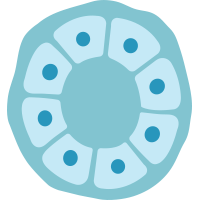
Mammary Cell News
Mammary Cell News is an online resource covering the latest research into breast cancer and mammary cells.
A Novel Nav1.5-Dependent Feedback Mechanism Driving Glycolytic Acidification in Breast Cancer Metastasis
[Oncogene] Researchers reported that protein expression of the Nav 1.5 voltage-gated Na+ channels subtype strongly correlated with increased metastasis and shortened cancer-specific survival in breast cancer patients.
Ipatasertib plus Paclitaxel for Patients with PIK3CA/AKT1/PTEN-Altered Locally Advanced Unresectable or Metastatic Triple-Negative Breast Cancer in the IPATunity130 Phase III Trial
[Clinical Cancer Research] In the randomized Phase II LOTUS trial, combining ipatasertib with first-line paclitaxel for TNBC improved progression-free survival, particularly in patients with PIK3CA/AKT1/PTEN-altered tumors.
State of the Art Modelling of the Breast Cancer Metastatic Microenvironment: Where Are We?
[Journal of Mammary Gland Biology and Neoplasia] Mouse models such as syngeneic mammary cancer or human in mouse xenograft models have limitations for modelling human disease progression and cannot easily be used for investigation of drug resistance and novel therapy screening. To complement these approaches, advances are being made in ex vivo and 3D in vitro models, which are becoming progressively better at reliably replicating the tumour microenvironment and will in the future facilitate drug development and screening.
OS Therapies Announces Positive Safety Data from Phase I Clinical Trial of OST-HER2 in HER2-Expressing Breast Cancer and in Preclinical Efficacy in Models of...
[OS Therapies, Inc. (BusinessWire)] OS Therapies, Inc. announced positive data from a Phase I clinical trial of OST-HER2 in patients with HER2-expressing solid tumors in breast cancer and other cancers.
Conquer Cancer’s EveryGrant and Twisted Pink Award $200,000 Metastatic Breast Cancer Research Grant
[Conquer Cancer] Conquer Cancer®, the ASCO Foundation, in collaboration with Twisted Pink, has awarded the Twisted Pink Metastatic Breast Cancer Impact Award to Dr. Ashley Schreier for her work studying the impact of immunotherapies on metastatic triple negative breast cancer—the most advanced stage of the disease.
A Highly Potent Bi-thiazole Inhibitor of LOX Rewires Collagen Architecture and Enhances Chemoresponse in Triple-Negative Breast Cancer
[Cell Chemical Biology] Investigators discovered bi-thiazole derivatives as potent lysyl oxidase (LOX) inhibitors by robust screening of drug-like molecules combined with cell/recombinant protein-based assays. LXG6403 showed favorable pharmacokinetic properties, globally changed ECM/collagen architecture, and reduced tumor stiffness.
FANCI Inhibition Induces PARP1 Redistribution to Enhance the Efficacy of PARP Inhibitors in Breast Cancer
[Cancer Research] Researchers identified the suppression of FANCI as a therapeutic strategy to enhance the efficacy of PARP inhibitors in breast cancer. Elevated FANCI expression in breast cancer was associated with poor prognosis and increased cell proliferation and migration.
Targeting YES1 Disrupts Mitotic Fidelity and Potentiates the Response to Taxanes in Triple-Negative Breast Cancer
[Cancer Research] Researchers identified that YES1 was the most highly overexpressed Src family kinase in triple negative breast cancer and was associated with poor patient outcomes.
AKT-Dependent Nuclear Localization of EPRS1 Activates PARP1 in Breast Cancer Cells
[Proceedings of The National Academy of Sciences of The United States of America] Scientists reported that EPRS1 was present in both cytoplasm and nucleus of breast cancer cells with constitutively low phosphatase and tensin homolog (PTEN) expression.
Long Noncoding RNA Profiling Unveils LINC00960 as Unfavorable Prognostic Biomarker Promoting Triple Negative Breast Cancer Progression
[Cell Death & Disease] Scientists profiled long non-coding RNA expression in 96 breast cancer cases, revealing significant differences compared to normal breast tissue. Depletion of LINC00960 significantly reduced triple negative breast cancer cell viability, colony formation, migration, and three-dimensional growth, while increasing cell death.
CCN6 Suppresses Metaplastic Breast Carcinoma by Antagonizing WNT/β-Catenin Signaling to Inhibit EZH2-Driven EMT
[Cancer Research] Scientists showed that CCN6 interacted with the Wnt receptor FZD8 and co-receptor LRP6 on metaplastic breast carcinoma cells to antagonize Wnt-induced activation of β-catenin/TCF-mediated transcription.
Replication Timing Alterations Are Associated with Mutation Acquisition during Breast and Lung Cancer Evolution
[Nature Communications] Investigators assessed the impact of altered replication timing on cancer evolution by analyzing replication-timing sequencing of cancer and normal cell lines and 952 whole-genome sequenced lung and breast tumours.
For over a decade, Mammary Cell News has been keeping the global scientific and medical communities informed about the latest research, reviews, and news in the field of mammary tissues. Our editors gather publications on the topic of mammary cell differentiation and characterization, as well as the progression and treatment of breast cancer. We also keep scientists up-to-date on the latest policy changes, job postings, and events.

 Cancer Stem Cell News
Cancer Stem Cell News Cell Therapy News
Cell Therapy News Dermal Cell News
Dermal Cell News Endothelial Cell News
Endothelial Cell News ESC & iPSC News
ESC & iPSC News Extracellular Matrix News
Extracellular Matrix News Hematopoiesis News
Hematopoiesis News Hepatic Cell News
Hepatic Cell News Human Immunology News
Human Immunology News Immune Regulation News
Immune Regulation News
 Intestinal Cell News
Intestinal Cell News Mammary Cell News
Mammary Cell News Mesenchymal Cell News
Mesenchymal Cell News Muscle Cell News
Muscle Cell News Neural Cell News
Neural Cell News Organoid News
Organoid News Pancreatic Cell News
Pancreatic Cell News Prostate Cell News
Prostate Cell News Pulmonary Cell News
Pulmonary Cell News
